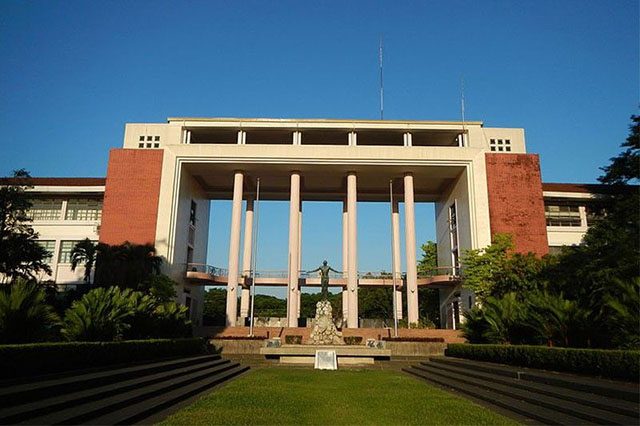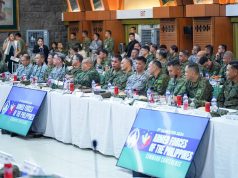
Filipinos called for accountability after the military admitted that there were “inconsistencies” with its now-deleted list red-tagging some former University of the Philippines students as communist rebels.
The Armed Forces of the Philippines’ Information Exchange on Sunday said that “thorough validation is being undertaken” by the team after it shared names of some UP alumni “who became NPA members,” either “dead” or “captured.”
NPA stands for the New People’s Army, the armed wing of the Communist Party of the Philippines.
“Inconsistencies regarding the list of some of UP students who became NPA was brought to our attention. In view of this, we inform our followers and the public that thorough validation is being undertaken by our team to rectify the information,” AFP Information Exchange said on Facebook.
“After said validation, clarification and appropriate actions will be promptly done. Stay safe and Godbless,” it added.
In a separate post, the AFP Information Exchange also apologized and said that it is “already conducting an internal investigation as to how the list got published.”
“Personnel who are responsible will be held to account.
We want to assure the public that we are now reviewing our processes and procedures to ensure that similar incident will not happen again in the future,” it added.
Reports said that the apology came hours after Defense Secretary Delfin Lorenzana acknowledged the red-tag mistake and called it an “unpardonable gaffe” on the military’s part.
A digital news website reported that among those red-tagged at least eight people were discovered to be alive, not captured and have not been linked to the communist rebels.
These include journalists, former government officials, lawyers, teachers and entertainment personalities, who all denied having supposed links to the NPA.
National Union of Journalists of the Philippines was able to take a screenshot of the post before the military deleted it.
UP Diliman Chancellor Fidel Nemenzo expressed “grave concern” over the military’s move. He said that a “military database that is riddled with factual errors may unduly become the basis for overt and covert military action” against their students and alumni even “across four decades or more. ”
“It is unthinkable that despite the millions of taxpayers’ money poured into military intelligence, the AFP is making such baseless accusations, in the process violating the civil liberties and putting at risk the lives of responsible citizens who are actively contributing to nation-building in their chosen professions,” he said on Sunday.
Social media users asked the military to be accountable and responsible for its actions following the latest red-tagging gaffe.
“Report AFP for posting fake information. They deserve to be banned from any social media networks!!!” a Twitter user exclaimed in response to the red-tagging reports.
“WTF happened to verifying information before posting them? AFP needs to be banned from all social networks for spreading fake news. Citizens of the PH aren’t safe from your murderous institution anymore,” another online user wrote.
“FILE FOR LIBEL, THIS IS RED-TAGGING AND HARMFUL,” a different Filipino likewise commented on behalf of those who were included in the list.
Six of the UP alumni named on the list were mulling to file cyber libel and contempt charges against the military and defense officials for the “malicious inclusion” of their names in the list.
Other universities were also claimed to be “recruitment havens” of the NPA without evidence.
Lt. General Antonio Parlade Jr. claimed that UP, along with Ateneo de Manila University, University of Santo Tomas, De La Salle University and the Far Eastern University, were holding recruitment activities to incite students to join communist rebels.
The universities in a joint statement denied the allegations and said that the charges were “really getting old” and that they were “irresponsibly” cast without proof.
In 2018, Parlade claimed that 18 universities and colleges were supposedly inciting students to rebel against the government through film screening activities as part of the “Red October” plot.
These were denied by the institutions.
READ: Four universities reject accusation of Maoist rebel recruitment on campus
Dangers of red-tagging
Red-tagging is defined as “the act of labelling, branding, naming and accusing individuals and/ or organizations of being left-leaning, subversives, communists or terrorists (used as) a strategy…by State agents, particularly law enforcement agencies and the military, against those perceived to be ‘threats’ or ‘enemies of the State.'”
The term “red” is used to refer to communists or socialists, often in a derogatory manner.
VERA Files said that the term is a reference to the former Union of Soviet Socialist Republics. The Soviet flag was red and features a gold hammer, sickle and a star in its upper left corner.
The fact-checking organization also warned that red-tagging can “can lead to warrantless arrests, torture, enforced disappearances, or extrajudicial killings” in its worst form, based on a 2012 study by the International Peace Observers Network (IPON) Philippines.
IPON is a nonprofit human rights organization based in Hamburg, Germany.
Ephraim Cortez from the National Union of Peoples’ Lawyers said that red-tagging is also “being used to justify attacks and harassments against activists and government critics.”








